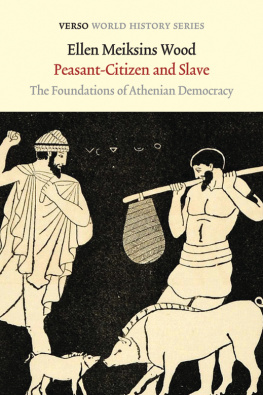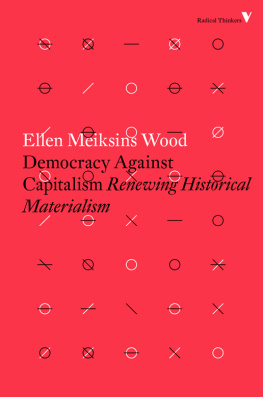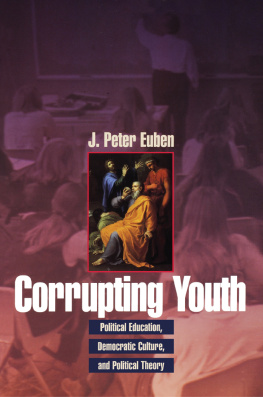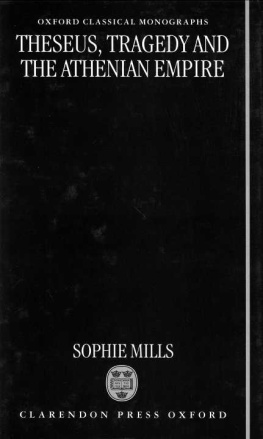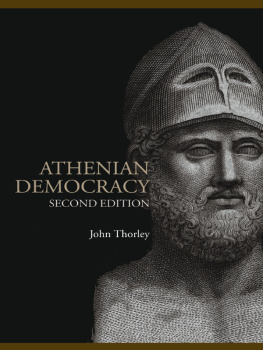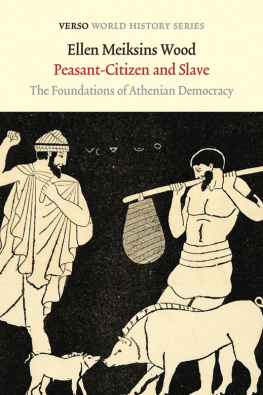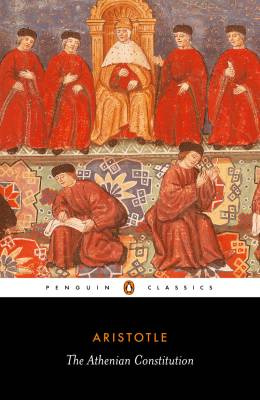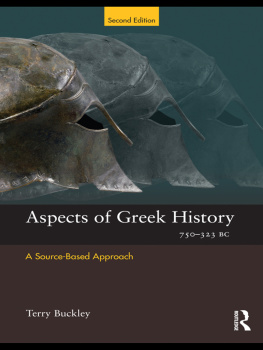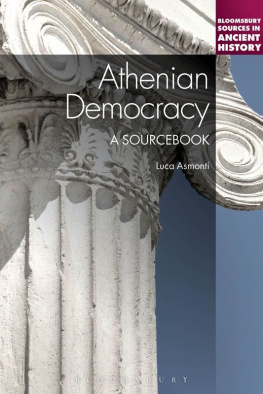Acknowledgements have become so much a matter of routine that it seems necessary to insist that these expressions of thanks are more than just a ritual. I owe a continuing debt to Neal Wood, not simply for his support and advice on this single piece of work but for the years of discussion, joint teaching and co-authorship which have been absorbed in it. Perry Anderson deserves my very particular gratitude for the characteristic generosity with which he has subjected my work to painstaking and constructive criticism, in an effort to strengthen arguments with which he often profoundly disagrees. My thanks also to Professor Ernst Badian, whom I have never met but who, as editor of the American Journal of Ancient History which published the article (Agricultural Slavery in Classical Athens; AJAH 8:1 [1983], 1986) that forms the basis of she nor any of my other advisers and critics can be held responsible. Finally, I wish to express my gratitude to the staff at Verso, especially for tolerating my anxieties; and to Glendon College, York University, for the faculty fellowship which helped me to complete work on this book.
Unavoidably, there have been additions to the relevant literature since work on this book was completed, and I shall simply have to live with the regrets occasioned by my failure to get them in time. There is one book, however, which I really must mention, the one major scholarly study of Athenian democracy to reach me in this dangerous period between completion and publication: Martin Ostwalds From Popular Sovereignty to the Sovereignty of Law: Law, Society and Politics in Fifth-Century Athens (Berkeley and Los Angeles: University of California Press, 1986). The easiest thing to say is that this book (to my enormous relief) neither renders mine redundant since it examines the democracy in a very different aspect nor does it conflict with my own account; but I very much wish that it had been ready to hand as I was writing my book. Although I did not set out to trace the institutional development of Athenian democracy (just as Ostwald did not intend to explore its social foundations), my understanding of popular power in Athens would have been greatly enriched by his analysis of the process by which popular sovereignty was established, from the first stages of legislative control, to the most far-reaching popular control of the administration of justice the world has ever known (p. 69), and finally the subordination of popular sovereignty to the sovereignty of law when the democracy was restored after the oligarchic coup of 404/3. Certainly my remarks concerning the effects of the democracy on Greek culture would have gained much from Ostwalds discussion of popular sovereignty and social thought: for example, he elaborates his earlier study of nomos, demonstrating how changes in that concept and its increasing association with a notion of enactment, a beginning in time brought about by human intervention expressed a general trend in the fifth century to assign mortals a higher degree of control over their world reflected in the specific attribution to human initiative not only of the laws by which society is governed politically but also of its customs, behavioral norms, and, to a more limited extent, religious practices. Norms, which before Cleisthenes were thought of as having existed from time immemorial, now came to be regarded as having been enacted and as being enforceable in a way similar to that in which statutes are decided by a legislative agency (p. 93). I wish I had said that.
E.M.W.
This book represents, among other things, an attack on conventional wisdom, but it is a conventional wisdom whose logic permeates scholarly studies. Just the other day, I came across a statement in the Guardian which illustrates to perfection the kind of misconception I have in mind and its wide-ranging effects. In an article on anti-racist maths (The Unknown Quantity, Tuesday, 3 November 1987) a senior lecturer at a London polytechnic was explaining the proposition that maths is as much a social invention as any other form of knowledge. So far so good. The interviewer raised the inevitable objection. Isnt the Pythagorean theorem (for example) value-free and culturally neutral? The difference between Greek and Babylonian maths, came the reply, is that the Greeks brought in abstractions because they were a slave society, work was beneath them whereas the Babylonians did work and their maths were related to their working, practical lives. The great advance in Greek maths was because of certain social values.
Now I have no objection in principle to the notion that maths, like other forms of knowledge, is a cultural artifact (a proposition which, it apparently needs to be said, does not imply that mathematical theorems are false, whatever their provenance). But this interpretation of Greek maths is simply nonsense. It is, however, a nonsense which itself represents a significant cultural artifact, constructed out of historical misconceptions that have become part of Western Culture.
Greece was certainly a slave society (though to what extent that description already applied to the time of Pythagoras in the sixth century BC is another question), but it is equally true that chattel slavery in Greece had as its corollary a citizen population of working peasants and craftsmen. Poleis whose citizens were most completely spared the necessity, even the right, of working for a living tended to be those in which other forms of dependent labour predominated over chattel slavery the helots of Sparta, the serfs of the Cretan cities or Thessaly. In the most notable slave society of ancient Greece, classical Athens, the majority of citizens laboured for a livelihood. The difference between these particular Greeks and the Babylonians was certainly not that Athenians regarded labour as beneath them while Babylonians worked, but, on the contrary, that labouring Athenians were full citizens while Babylonian workers were not.
The unique status accorded by Greek democracy to people who worked for a living was the culmination of a historical process which also produced a distinctive cultural legacy the kind of pride in the practical arts which even before the democracy encouraged Greek craftsmen to sign their work (in sharp contrast to the anonymity of their counterparts in the ancient Near East) and which inspired dramatists like Aeschylus and Sophocles to glorify the practical arts as the foundation of civilized life. (It is, incidentally, worth noting that mathematics was lumped together among these arts with very practical activities like farming, carpentry and navigation.)

